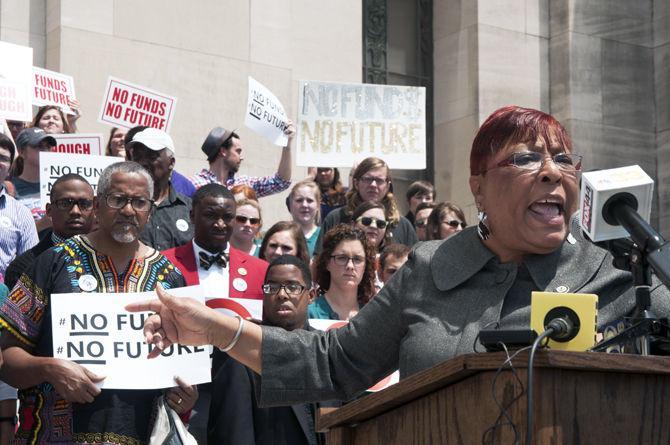Throughout history, Americans have used protests to bring awareness to important social, political and economic issues.
We all remember reading about protests and civil disobedience in history classes such as bra burnings or marches for African-American rights. All the marches, protests and sit-ins seem more romanticized than historical. This time last year, I’d tell you that protesting was dead in America.
Ferguson seemed to revive American activism. Suddenly people were on the streets demanding equality. It was like a step back into the ’60s when citizens protested for their rights. Now, people are protesting in Baltimore. Cops in that city failed to give a man proper medical attention after they arrested him, and it was apparent that he couldn’t breathe. People are now once again protesting against the injustice and brutality of cops.
The media are portraying these protests as mere riots on the streets. And while there are riots and looting, the majority of protests have been peaceful.
Whether you agree or disagree with the protests around the country concerning police brutality, you’re most likely still talking about them.
And the protests are working. People are finally having conversations about police brutality in America. Statistics and stories on police brutality are popping up on my Facebook timeline more than ever. Americans hold police accountable now as opposed to blindly following orders. More people are recording instances of police misconduct, which is further spreading the conversation of police misconduct.
African Americans aren’t the only ones seeing the injustice in America. Students are also seeing systemic injustice. For-profit colleges are exploiting students by charging them thousands of dollars for degrees that aren’t really worth anything.
Hundreds of students who went to Corinthian Colleges are now refusing to repay their students loans. That for-profit institute lied about job prospects for those students, and now these students are thousands of dollars in debt for a degree that won’t get them a job.
They’re calling on the U.S. Department of Education to forgive their debt. They are taking a gamble with their credit by refusing to repay these student loans, but now, people are talking about the exploitation of these colleges.
People are generally fed up with the system. African- Americans need justice. The LGBT community needs equality and the same protections as other minority groups. And college students more than ever need protection from the partisan political games of funding and defunding universities.
Thursday, at the Louisiana State Capitol, college students and faculty will have a chance to protest Louisiana’s cuts to higher education. If nothing changes, Louisiana will cut 82 percent of state funding to LSU. That means programs closing, professors leaving and a spike in tuition.
Students on average already fund universities at higher rates than states. According to the Huffington Post, student tuition on average covers 25 percent of revenue for public colleges, and states cover about 23 percent. It didn’t always used to be that way. States used to fund universities at 75 percent in the ’70s
LSU is well below average. In an interview with The Advocate, LSU president F. King Alexander said that Louisiana only funds LSU at 13 percent. With an 82 percent decrease, Louisiana would fund LSU at about 3 percent.
Over the years, states decided that higher education was no longer a priority, so they’ve cut funding. Universities got hit badly after the recession in 2009. States no longer had money to fund schools, so those were the first to go.
Well, the recession is over, and Louisiana lawmakers still haven’t restored our university’s funding.
Lawmakers don’t want to raise revenue during an election year. They’re scared a tax increase will cost them a seat in the legislature, and Gov. Jindal would veto most tax increases anyway. So, because of politics, students must once again suffer. Politicians won’t listen to us unless we make them.
Protests are an important and necessary part of democracy. It’s a voice to the powerless to ensure equality among people. They’ve been important in shaping our civil rights movements in America, and now we need them for students’ rights. Even if the protest won’t directly lead to funding for the University, at least Louisiana knows that we won’t go down without a fight.
If this protest gets national attention, it could spark a revolution among students in our country. We’re not the only ones suffering budget cuts. Legislators are ignoring students all over the country, and it’s time for that to end.
We need a fair shot at an education and a future. Our parents had a chance to graduate will little to no debt. Our parents didn’t have to worry about drastic budget cuts. Why should we have to?
If you don’t think protesting works or if you can’t be there, then partake in the online campaign to contact legislators to tell them to stop the budget cuts.
Every LSU student, faculty and alum has an interest to protect our school. If you don’t go to this event or contact your state legislators, then you are part of the problem.
Professors, this protest is probably more important than your classes right now. Excuse your students and come march with us. You have as much to lose as we do.
Alexander, your university is in jeopardy. You need to cancel class and encourage all students to attend this protest. Contact other Louisiana universities and encourage them to do the same.
Other than writing our legislators, protesting is the only way we can change anything. Louisiana students and professors from all over the state need to march in unison at the Capitol tomorrow.
Cody Sibley is a 19-year-old mass communication freshman from Opelousas, Louisiana. You can reach him on Twitter at @CodySibley.
Opinion: LSU community should protest budget cuts
By Cody Sibley
April 28, 2015
Louisiana Representative Patricia Smith speaks about state budget cuts and higher education during a protest on Wednesday, April 15, 2015 outside of the Capitol building.
More to Discover








